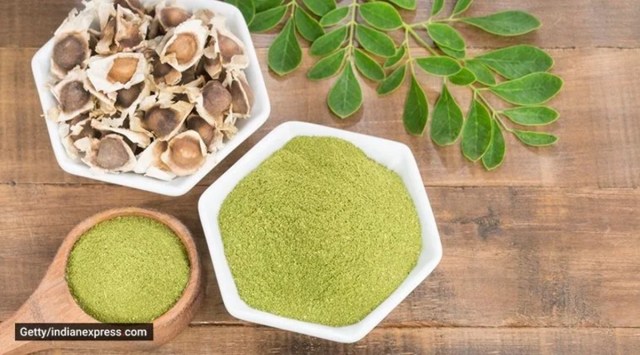📣 For more lifestyle news, click here to join our WhatsApp Channel and also follow us on Instagram
One of the best sources of iron for women during pregnancy and post childbirth is…
Vegetarians, especially during pregnancy and post-childbirth while breastfeeding, have increased iron needs, said Suvidhi Jain, lifestyle, exercise and nutrition coach and founder - LEAN by Suvidhi
 Here's what to consider about moringa (Source: Getty Images/Thinkstock)
Here's what to consider about moringa (Source: Getty Images/Thinkstock)Pregnancy is one of the most beautiful phases of a woman’s life. But during these crucial nine months, they need to be extra cautious about the food and nutritional supplements they consume so as to not develop any deficiencies. This is even more important, as experts point out that the most common deficiency during pregnancy and post-childbirth is that of iron, commonly known as anaemia.
Yoga instructor Shalini Abhilash took to Instagram to share that most women feel high levels of fatigue, exhaustion, weakness or hormonal-related issues in these stages due to iron deficiency, which, according to her, can be managed with a natural food — moringa leaves.
“While most women are recommended iron supplements in pregnancy and post-childbirth, it’s still important to consume moringa powder because it’s not just a source of iron but also a superfood packed with multiple other important nutrients like calcium, and magnesium. It is also a must for immunity building as no medicines like Paracetamol or pain killers are prescribed during pregnancy and post-childbirth. So, developing immunity and gut health should be a high priority in these stages,” Shalini added.
View this post on Instagram
Adding, Dr Shobha Gupta, medical director and IVF specialist from Mother’s Lap IVF Centre New Delhi and Vrindavan said that moringa leaves help in preventing stress, something women often feel during pregnancy, by helping regulate the cortisol levels of pregnant women,
“Also, many pregnant women often complain of uncomfortable pregnancy-related constipation, diarrhea, bloating, and cramping. Moringa contains up to nine per cent fibre, which aids in improved digestion and nutrient absorption. Improved digestion helps eliminate harmful substances such as parasites and bacteria from the intestinal tract. Additionally, moringa contains Vitamin B (among many others) that assists in the prevention of any other digestive concerns,” said Dr Gupta.
Shalini further shared that fibre and iron are essential nutrients for breast milk production, and being rich in them, moringa leaves also contribute to better lactation.
 How are you taking care of your nutrition in pregnancy? (Source: Getty Images/Thinkstock)
How are you taking care of your nutrition in pregnancy? (Source: Getty Images/Thinkstock)
How to consume moringa?
According to Shalini, consuming a teaspoon of moringa powder mixed with 100 ml of lukewarm water can help.
Things to remember:
*There’s no compulsion it has to be consumed empty stomach, so feel free to consume any part of the day. However, consume it only during the mornings or before 3 pm, so it’s easy to digest. “Never consume post 4 pm,” said Shalini.
*If you feel uneasy in your gut (won’t be in most cases) then don’t consume, your gut is not ready for this. You can try other ways, like using moringa leaves in cooking, said Shalini.
*Even though it’s a natural food, consult your doctor once because they know your health conditions in detail.
Moringa, with its impressive iron content of 28 mg per 100 gm, serves as an excellent source of iron for vegetarians, mentioned Suvidhi Jain, lifestyle, exercise, and nutrition coach and founder – LEAN by Suvidhi.
“However, when considering iron sources, it’s crucial to understand the distinction between heme iron and non-heme iron, she said.
Notably, heme iron is predominantly found in meat, fish, and poultry, while non-heme iron is present in plant-based foods such as whole grains, seeds, legumes, dark leafy vegetables, and nuts. Heme iron boasts higher bioavailability, meaning it is more readily absorbed by the body, with an absorption rate of approximately 25-30 per cent. On the other hand, non-heme iron sources exhibit lower absorption rates, ranging from 1-10 per cent.
“Since vegetarians rely on non-heme iron sources due to their dietary restrictions, it becomes vital to incorporate a variety of these sources to meet their daily iron requirements. Vegetarians, especially during pregnancy and post-childbirth while breastfeeding, have increased iron needs. Therefore, moringa can serve as a beneficial addition to their diet,” said Jain.
Vegetarians can supplement their non-heme iron sources by incorporating moringa into their meals, compensating for the limited availability and absorption rates, added Jain.
📣 For more lifestyle news, follow us on Instagram | Twitter | Facebook and don’t miss out on the latest updates!
📣 For more lifestyle news, click here to join our WhatsApp Channel and also follow us on Instagram


Photos




- 01
- 02
- 03
- 04
- 05




















